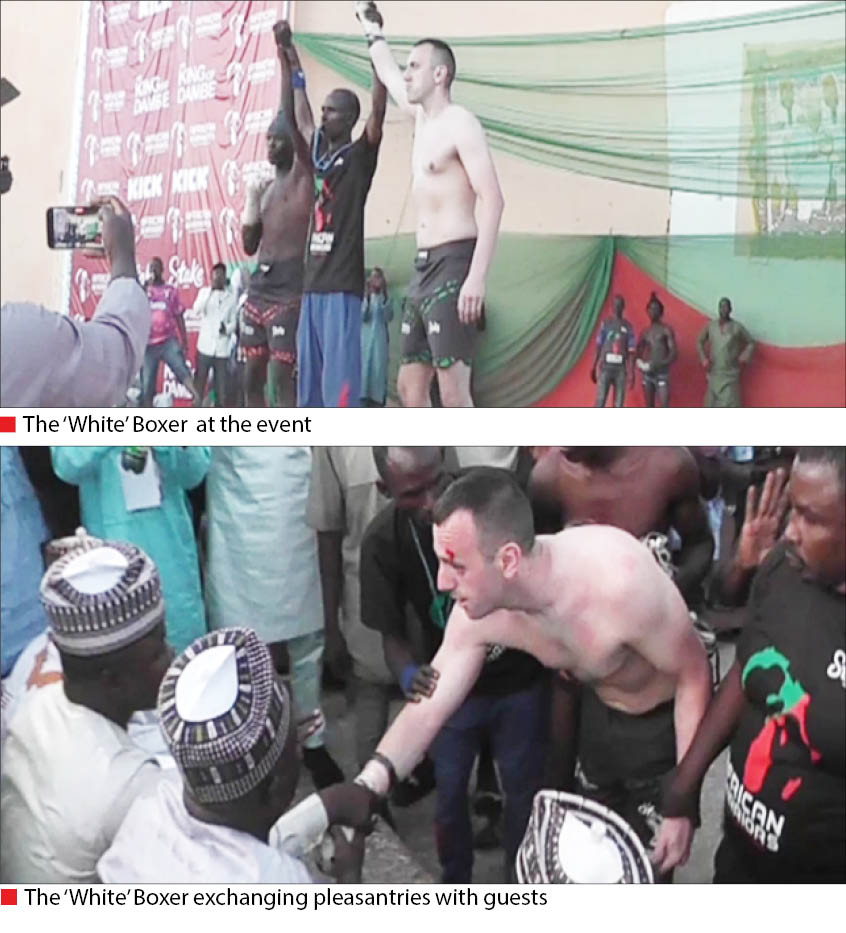Day British boxer stunned Dambe spectators in Katsina
A British boxer, Look Weyland, stunned Katsina residents recently during a local boxing competition, popularly known as Dambe in northern Nigeria. Dambe is a popular traditional sport, particularly among communities of butchers in Hausa towns. In Katsina, residents were mesmerised by the British national, who came all the way from England to display his skills among […]

A British boxer, Look Weyland, stunned Katsina residents recently during a local boxing competition, popularly known as Dambe in northern Nigeria.
Dambe is a popular traditional sport, particularly among communities of butchers in Hausa towns.
In Katsina, residents were mesmerised by the British national, who came all the way from England to display his skills among local boxers.
When he was introduced to the game, Weyland did not disappoint.
- Two dead, 8 injured in Lagos-Ibadan expressway crash
- Illegal mining denying Nigeria 91% of sector revenue – ECOWAS Speaker
After showering praises on the Briton, the enthusiastic spectators encouraged him to feel at home. He quickly jumped into the boxing arena, willing to take on an opponent, Dogon Yellow Dansuru.
The fight between Weyland and Dansuru lasted for two and half minutes without a winner, as thousands of spectators sprayed money on the foreigner in appreciation of his performance.
Abdulrahman Sama’ila, one of the regular attendees of local boxing events in the history of Katsina State and a culture enthusiast, said he had been watching local boxing for the past 25 years but the fight between Weyland Dansuru was the most exciting recently.
Sama’ila also said, “The most fascinating part of the white man’s fight against Dogo Dansuru is the skills and sportsmanship he displayed against his opponent.”
The passion exhibited by Weyland during the competition elicited more excitement from the spectators, who said they could see skills and professionalism in him. They said he could become one of the best Dambe champions in northern Nigeria in future.
Lawal Badamasi, who watched how the white man slogged it out with Dansuru, said his coming was one of the best things that happened to local boxing in Katsina State in recent years.
Badamasi said, “I think you would agree with me that majority of the spectators you see here came purposely to watch the performance of the white man. He was the reason the game was delayed towards the closing time because if he played his part earlier, many would leave the place.”
According to the organisers of the competition, the participation of the British national in the traditional boxing in Katsina was borne out of his interest and passion for the Hausa culture, which he built over 15 years ago.
The Commissioner for information and culture in Katsina State, Dr Bala Salisu Zango, said the white man demonstrated fascinating skills, which even the local boxers could learn from, including his conduct and other attributes.
“I can tell you without fear of contradiction that since his arrival, the white man took his time to study the situation before he indicated the willingness to participate in Dambe. And he chose his opponent himself. Secondly, this is somebody from Britain who has been watching Hausa culture and tradition as something interesting at a time our younger generations are copying western cultures,” Zango said.
He advised all stakeholders to strive hard to preserve the cultural heritage of not only northern Nigeria but the country as a whole. He called on local boxers to be more accommodating so as to attract more people into the system, which he said had the potential of adding value to Nigeria’s economy.
Although Weyland declined answering questions when journalists approached him shortly after the encounter with Yellow Dansuru, he said his participation and passion for the traditional boxing in northern Nigeria started long time ago. He is hopeful that one day he would be among the best local boxers in the North.
The British national also said he was overwhelmed by the crowd that turned out to watch his encounter with Dansuru. He called on residents and organisers of the competition, as well as custodians of the age- long tradition, to continue to promote it because of its socio-economic potentials.
